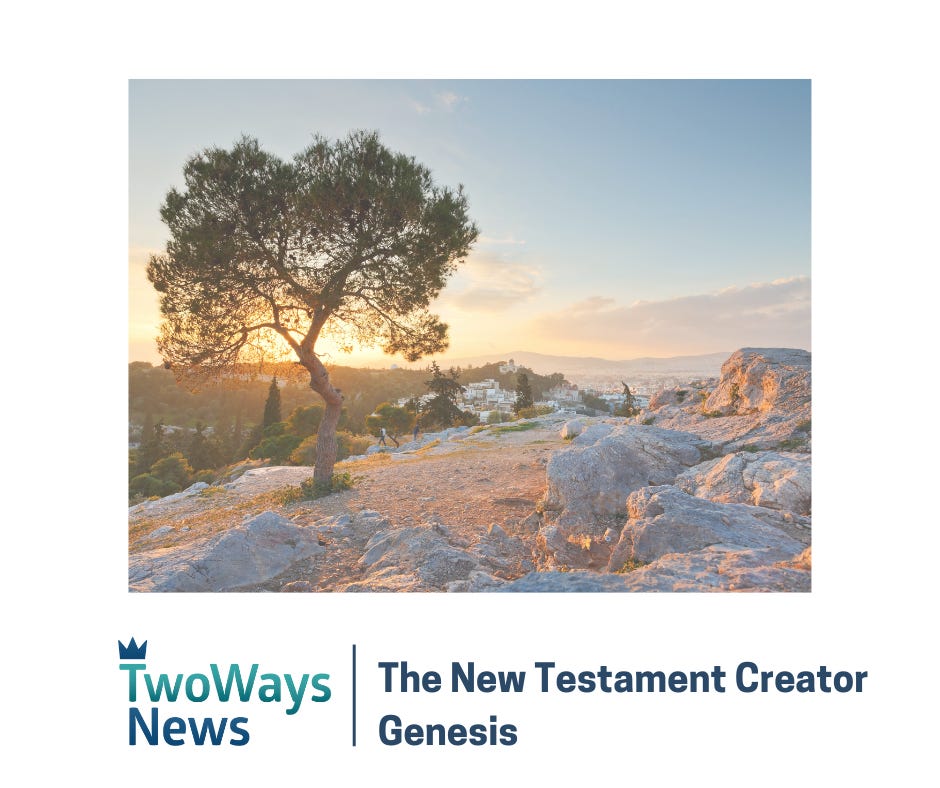Dear friends,
Peter and I have had a great time pondering the early chapters of Genesis. But the best commentary and authentic understanding of Genesis is found in the New Testament. So for the next few weeks, we are turning there to see what the New Testament makes of the early chapters of Genesis.
Yours,
Phillip
Phillip Jensen: Welcome to Two Ways News. It's great to have you listening or reading again this week.
Thank you all for your feedback, which is always encouraging to us and helpful when people correct us. We like that, and we will answer some of the questions.
Peter Jensen: For some questions, I don't know the answer. Others, though of interest to a particular person, may not be of interest to everybody. It doesn't mean they're bad questions. So we will be a bit selective, but we welcome all questions.
Phillip: We welcome even more that you might share Two Ways News with other people because we're seeing the number of listeners growing. If you've got friends or relatives who may be interested, do mention it. To our subscribers, thank you for your generosity, because it's out of generosity that we can provide this freely to more people.
The New Testament is the authoritative commentary on Genesis. There are loads of commentaries on Genesis, but the Bible has one consistent message, and so the teaching of Genesis is the same as the teaching of the New Testament, because it's the Holy Spirit who has inspired both Old and New Testaments with the one message. We need to check our understanding of Genesis against the Holy Spirit's understanding of Genesis as revealed in the New Testament. Before arriving at the New Testament, there's more than Genesis 1-3 about creation.
Peter: Yes, there is plenty in the rest of the Old Testament. For example, John Woodhouse, our mutual friend, told me how important Job was in this, particularly Job 36 and 39, where God speaks, and he describes his great work in creation. It’s full of wonderful ideas and cast in wonderful language. You can study it and be overwhelmed by the sheer majesty and the wonder of God. It's one of the great poems of the Bible.
Phillip: Yes, those last chapters of Job are great indeed.
Peter: Poetry simply takes the ideas we have and exalts them into language that lifts us. Certainly, Job 36 does exactly that. Not only Job: there's also Psalm 8, where, famously, we're asked, “What is man, that you are mindful of him?” When I think of the rest of the Bible, I turn to the great opening of Psalm 8
O LORD, our Lord,
how majestic is your name in all the earth!
You have set your glory above the heavens.
Out of the mouth of babies and infants,
you have established strength because of your foes,
to still the enemy and the avenger.
When I look at your heavens, the work of your fingers,
the moon and the stars, which you have set in place,
what is man that you are mindful of him,
and the son of man that you care for him?
How extraordinary and how true. I fear sometimes that, if you live in a city, you forget this. It's so easy to see the works of human hands and not to see the stars, the countryside, or the wonder of the animals that God has created. A similar thing is expressed in Psalm 19
The heavens declare the glory of God,
and the sky above proclaims his handiwork.
Day to day pours out speech,
and night to night reveals knowledge.
There is no speech, nor are there words,
whose voice is not heard.
Their voice goes out through all the earth,
and their words to the end of the world.
It's a God-inspired picture of the universe in such a way that we say, ‘Who on earth has made this?’ So you glorify God because of what you see around you. There are other passages; for example, I'm always struck by Psalm 119:89-91
Forever, O LORD, your word
is firmly fixed in the heavens.
Your faithfulness endures to all generations;
you have established the earth, and it stands fast.
By your appointment they stand this day,
for all things are your servants.
So we get the picture, not merely of the great creator, but of the one who sustains all things every moment. In other words, it's not just that the Lord is a creator like a famous painter who will create and then pass away, with the painting remaining. The Lord creates, but he sustains. Every molecule only exists and continues because the eye of the Lord is upon it. There are so many other passages we could turn to, like Psalm 104 and Psalm 148, where glorying in the world leads the heart to the God who has done this remarkable thing. Wherever we go, we see the glory and fruitfulness of creation and the majesty of God.
Phillip: Yes, you move outside the Psalms, for example in the prophets. Isaiah 66:1-2 is extraordinary
Thus says the LORD:
“Heaven is my throne,
and the earth is my footstool;
what is the house that you would build for me,
and what is the place of my rest?
All these things my hand has made,
and so all these things came to be,”
declares the LORD.
It's one of those passages which speaks of ex nihilo, the concept that out of nothing God has made things to exist. Or Jeremiah 10:5
Their idols are like scarecrows in a cucumber field,
and they cannot speak;
they have to be carried,
for they cannot walk.
Do not be afraid of them,
for they cannot do evil,
neither is it in them to do good.”
There is none like you, O LORD;
you are great, and your name is great in might.
Who would not fear you, O King of the nations?
The God of the Bible is the God of all the nations, and he is active. Or Habakkuk 2:18
“What profit is an idol
when its maker has shaped it,
a metal image, a teacher of lies?
For its maker trusts in his own creation
when he makes speechless idols!
Woe to him who says to a wooden thing, Awake;
to a silent stone, Arise!
Can this teach?”
God is our creator who has made us. He makes such incredible humans who can speak and who can act. We make at best statues that cannot speak, or move, or do anything, and have no will; yet we trust them, as opposed to the creator of all things. So the prophets lived in the assumption of the early chapters of Genesis, which we have seen is about the God who makes everything out of his will and out of nothing. But come back to the New Testament where we started. What is the witness of the New Testament about creation?
Peter: The story of the Old is fundamental to the New. The Bible interprets the Bible, and the God of the Old Testament is the God of the New Testament. It's important for us to recognize that. Hebrews 11:3 says
By faith we understand that the universe was created by the word of God, so that what is seen was not made out of things that are visible.
You and I have to create things out of things that exist already. But ‘by the word of his mouth God created everything’, as you said, out of nothing. Revelation 4:11 says
“Worthy are you, our Lord and God,
to receive glory and honour and power,
for you created all things,
and by your will they existed and were created.”
Then, as the apostle wrote, in the epistle of the Romans, of the sinfulness of human beings, he refers first and foremost to this one great God. Romans 1:18-20
For the wrath of God is revealed from heaven against all ungodliness and unrighteousness of men, who by their unrighteousness suppress the truth. For what can be known about God is plain to them, because God has shown it to them. For his invisible attributes, namely, his eternal power and divine nature, have been clearly perceived, ever since the creation of the world, in the things that have been made. So they are without excuse.
I walk through the bush and see it now with the eyes of the gospel and say, ‘How could we fail to see that there is a God?’ There is but one God; he is the Lord God who has created these things.
Phillip: Nothing produces nothing. That's the problem that those who do not have God need to face. They may ask the question, ‘Where did God come from?’ That's for God to answer. But where does nothing turn into something so magnificent as the creation? It’s a basic fundamental problem.
Peter: It's for all people; it is not as though only those who have the Bible have this knowledge, for all are called to worship him. All around us is the evidence for his unity, his oneness, and his being.
Phillip: As you said in Hebrews 11, it's by faith we know it. That is, Romans 1 says we can see it, and therefore we need to search for the creator. Hebrews 11 is saying we know it because the creator has made it known to us. Even in Romans 1, what can be known about God is because he has made it known to us. The thing itself doesn't speak except to those whom God is speaking to. When the gospel is being preached to the Jews, the creation is not referred to. It doesn't need to, because it's so fundamental to the Old Testament. But when they speak to Gentiles, idol worshippers, that's when it comes out in the gospel. In Acts 14, Paul is in Lystra, and a miracle takes place. The people start to worship Barnabas and Paul because they think they're the gods who have come amongst them, and Paul has to say in Acts 14:15-17
“Men, why are you doing these things? We also are men, of like nature with you, and we bring you good news, that you should turn from these vain things to a living God, who made the heaven and the earth and the sea and all that is in them. In past generations he allowed all the nations to walk in their own ways. Yet he did not leave himself without witness, for he did good by giving you rains from heaven and fruitful seasons, satisfying your hearts with food and gladness.”
The creation is a fundamental point of connection for the Gentiles. It's not needed for the Jews because the knowledge is there. You see it again in Paul's great speech in Areopagus, in Athens. As he walked around Athens, the great city of learning, and saw the idols, he was moved to leave the synagogue and preach in the streets. But he was challenged about his preaching and brought to the hill of Areopagus to have a philosophical discussion. He says in Acts 17:22-25
“Men of Athens, I perceive that in every way you are very religious. For as I passed along and observed the objects of your worship, I found also an altar with this inscription: ‘To the unknown god.’ What therefore you worship as unknown, this I proclaim to you. The God who made the world and everything in it, being Lord of heaven and earth, does not live in temples made by man, nor is he served by human hands, as though he needed anything, since he himself gives to all mankind life and breath and everything.
The God whom we worship, the real living God, made more than the houses. He made the whole earth and heavens. Yet the New Testament does advance us in the Christological nature of creation. So, think of the opening of John's Gospel.
The big change is that the New Testament brings us to Jesus, the Christ. The Christ's role is not just in saving the world but also in creation. That magnificent opening of John's gospel says that. John 1:1-3
In the beginning was the Word, and the Word was with God, and the Word was God. He was in the beginning with God. All things were made through him, and without him was not any thing made that was made.
Who is this? The Word? Verse 14 explains, “The Word became flesh and dwelt amongst us.” That is, God, when he was creating the world by his word, was creating the world by his Son. For his Son is the Word of God, through whom the world has been created.
Paul writes this in Colossians, which was written 20 or 30 years after Jesus died and rose again. Here is a Jewish man, a Jewish rabbi, a man committed to Pharisaic Judaism who became a Christian. He writes about Jesus in Colossians 1:15-16
He is the image of the invisible God, the firstborn of all creation. For by him all things were created, in heaven and on earth, visible and invisible, whether thrones or dominions or rulers or authorities—all things were created through him and for him.
I think we'll have to deal with ‘the image’ next time, Peter.
Peter: I think that's remarkable. Unexpected. I can remember seeing it and thinking, ‘What?’ That all things are created for Jesus, for Christ; I hadn't thought of that.
Phillip: No, because Jesus comes at Christmas, and the pre-existence of God's Son is a shock to those who start historically with a baby born in Bethlehem. But the baby born in Bethlehem was God himself who became flesh; the Word became flesh. So God created everything through his Word, through his Son, but then this other thing, for him. You and I have been created not for ourselves. That's not a complete shock given Genesis 1. We're created for God, but it turns out that we're created for Jesus. Now that is an extraordinary new revelation for us.
Peter: It leads into the whole area of the present work of Jesus: who Jesus is now and what he is doing. Sometimes we just forget about that, but the ascension of Jesus is a very important matter, and the present work of Jesus is extraordinarily important.
Another verse that says much the same thing about Jesus in Hebrews 1:2-3
…Whom he appointed the heir of all things, through whom also he created the world. He is the radiance of the glory of God and the exact imprint of his nature, and he upholds the universe by the word of his power.
I take it this is the Son of God.
Phillip: Both aspects of God and creation that you mentioned earlier, that is, starting it and sustaining it, are actually the work of Jesus.
Peter: Yes, God, the Son. It always leaves me surprised and a little speechless. It’s something I would not have thought. But when you do see the work of Jesus, you begin to see ‘how great thou art’.
Phillip: How great indeed! But, if I can push it still further, Peter, before we finish on the work of creation, it is not the beginning, the middle and the end. The work of the creation is still for the future, in some ways. I know you like what people call eschatology, the study of the end times, but there's more yet to be said about Jesus and creation, and us and creation, in terms of the future.
Peter: Yes, broadly, the Bible reminds us that there will be a new creation: the new heavens and the new earth that is to come. 2 Peter 3:11-13
Since all these things are thus to be dissolved, what sort of people ought you to be in lives of holiness and godliness, waiting for and hastening the coming of the day of God, because of which the heavens will be set on fire and dissolved, and the heavenly bodies will melt as they burn! But according to his promise we are waiting for new heavens and a new earth in which righteousness dwells.
So the Bible does not speak of the end of all created things, as if we're all going to be spirits. It speaks of the new heavens and the new earth, but a wonderful new heavens and new earth; an even more wonderful new heavens and new earth, in which righteousness dwells.
Another thing, I'll never forget the illumination that came to me about this many years ago, about the way the New Testament not only treats the idea of the end as being something that will be at the end, but also that the coming of Jesus, his death and his resurrection, in particular, signal the beginning of the end. In the end, all will be resurrected, but the first resurrection is the resurrection of the Lord Jesus – as a sort of signal that the last days are upon us ever since that happened and that the age to come is now invading the present. This comes out in 2 Corinthians 5:17 in that famous word where he says
Therefore, if anyone is in Christ, he is a new creation. The old has passed away; behold, the new has come. All this is from God…
In other words, those who turn to Christ in repentance and faith are born again and become new creatures, part of the new creation. We are both old and new. Colossians 3 tells us we have been resurrected, but we await our resurrection as well. In other words, in our own experience as Christian people, we are experiencing the age to come, but waiting for the age to come. Can you improve that, Phillip?
Phillip: Philippians 3:20-21 says
But our citizenship is in heaven, and from it we await a Saviour, the Lord Jesus Christ, who will transform our lowly body to be like his glorious body, by the power that enables him even to subject all things to himself.
We're already there in heaven, and creation continues in a new form, but it's still creation in the age to come. I'm not just a spirit floating in the age to come; I'm the new creation, and my lowly body will be transformed like his glorious body. The state of our present body is decrepitude. I'm just looking at you at this point.
Peter: Speak for yourself.
Phillip: But this age we live in is a dying age, and so our bodies are always dying, but there's going to be a transformation in the new creation, which has eternal life.
Peter: Yes, Romans 8:19-22
For the creation waits with eager longing for the revealing of the sons of God. For the creation was subjected to futility, not willingly, but because of him who subjected it, in hope that the creation itself will be set free from its bondage to corruption and obtain the freedom of the glory of the children of God. For we know that the whole creation has been groaning together in the pains of childbirth until now. And not only the creation, but we ourselves…
But we are the adopted children of God. Our future has begun.
Phillip: It is a great and glorious future, and it's the Creator who deserves all praise and honour for it. We do nothing; he does it all. That's why Revelation 4:11 which you mentioned and read to us earlier, says, “Worthy are you, our Lord and God, to receive glory and honour and power.” I wouldn't give anybody glory and honour and power and can't imagine a prime minister, a president or a king who deserves glory and honour and power. But God does, and we're told why in chapter 4, “For you created all things, and by your will they existed and were created.” It is the creator who is worthy of all honour, glory and power.
Scripture quotations are from The ESV® Bible (The Holy Bible, English Standard Version®), copyright © 2001 by Crossway, a publishing ministry of Good News Publishers. Used by permission. All rights reserved.
Links & Recommendations
For more on this topic, check out this sermon by Phillip on Revelation 4 called “The Creator in Heaven”.
Freely available, supported by generosity.
If you enjoy Two Ways News, why not lend us a hand? Consider joining our Supporters Club—friends who make it possible for us to keep producing this article/podcast.
To join the Supporters Club, follow the link below to the ‘subscribe’ page. You’ll see that there’s:
a number of ‘paid options’. To join the Supporters Club take out one of the paid ‘subscription plans’ and know we are deeply grateful for your support!
also the free option (on the far right hand side)












